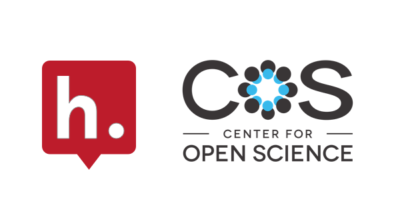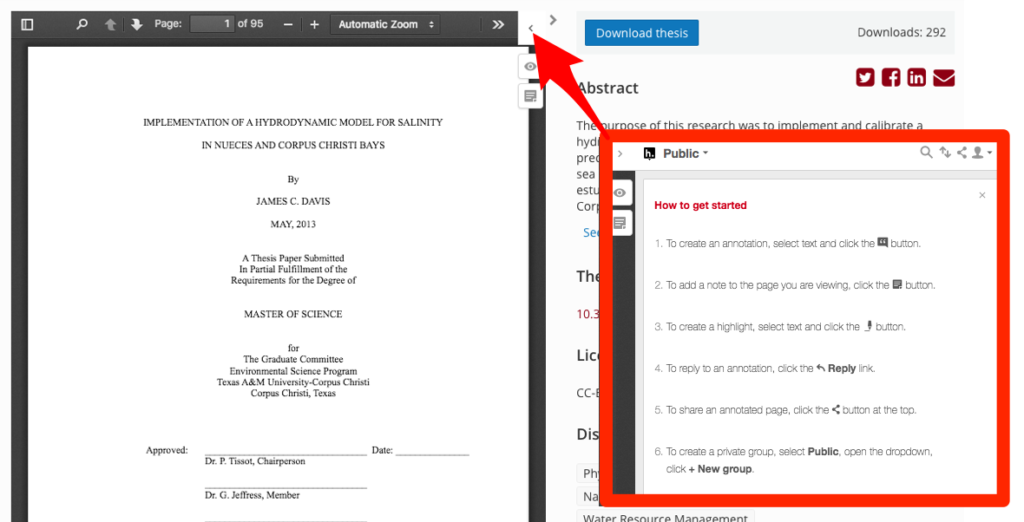Hypothesis Annotation Now Live on COS Open Science Framework Preprints

In Feb 2018, Hypothesis and the Center for Open Science (COS) announced their collaboration to bring open annotation to Open Science Framework (OSF) Preprints and the growing community of preprint servers hosted on OSF. Today, we are proud to announce that open annotation is now live, starting with OSF Preprints, SocArXiv, PsyArXiv, BITSS, EngrXiv, PaleorXiv, SportrXiv, Thesis Commons, MarXiv, INarXiv, NutriXiv, EarthArxiv, and the newest member of the community AfricArxiv.
Annotation on preprints will increase transparency in scientific practices by enabling researchers to collaborate, discuss research with peers, and share additional information directly on preprints both before and after they are posted. The partnership builds on the foundations laid by the publication of web annotation as a standard by the W3C, the pioneering work by Hypothesis to build an open annotation infrastructure, and by COS to offer OSF, a comprehensive platform for open scientific research and publication.
Annotations made on OSF preprint services will now be visible by default to anyone who views the content, removing the need to install or manage browser plugins. Once they set up a Hypothesis account, scholars can now read, create and reply to annotations and page notes through a simple interface directly over each preprint file itself. Readers will be able to make public annotations, private notes, or create collaboration groups. Annotations will be moderated by Hypothesis according to their community guidelines. Users who think an annotation needs possible moderation can flag it for review. Read more detailed guidance on annotating OSF preprints.
“Transparency, openness and collaboration are at the core of the COS mission,” said Matt Spitzer, COS’s Community Manager. “Working with Hypothesis to enable annotation and commenting helps our community realize important progress towards that mission.”
This launch is one of the first public realizations of shared goals developed within a larger preprint community collaboration at gatherings like the 25 January 2018 summit convened by Hypothesis at the Sloan Foundation offices in New York City. There, representatives from many of the scholarly preprint services gathered to discuss potential benefits and considerations in bringing annotation to article preprints. While continuing to make annotation available on more preprint servers, this community plans to collaborate further to address a next set of issues tied to user identity, moderation, and versioning.
“One of the key benefits of preprints is that they can facilitate feedback to authors while they’re still receptive to that input. By enabling annotation natively on the OSF platform, COS is providing a powerful new framework for author feedback.” notes Heather Staines, Director of Partnerships for Hypothesis. “We couldn’t be more thrilled to see what exciting developments will be showcased through annotation across these initiatives.”
To learn more about adopting open annotation in your own publications, contact Heather Staines, Director of Partnerships at Hypothesis and subscribe to news from Hypothesis.
Anyone interested in joining the ESSOAr community can contact essoar@essoar.org.
About COS
The Center for Open Science (COS) is a non-profit technology startup founded in 2013 with a mission to increase openness, integrity, and reproducibility of scientific research. COS pursues this mission by building communities around open science practices, supporting metascience research, and developing and maintaining free, open source software tools. The Open Science Framework (OSF), COS’s flagship product, is a web application that connects and supports the research workflow, enabling scientists to increase the efficiency and effectiveness of their research. Researchers use the OSF to collaborate, document, archive, share, and register research projects, materials, and data. Learn more at cos.io and osf.io.
Contacts
Media: Rusty Speidel <rusty@cos.io>, Marketing Manager
Starting a Branded Preprint Service: Matt Spitzer <matt.spitzer@cos.io>, Community Manager
Web: cos.io/preprints
Twitter: @osframework
